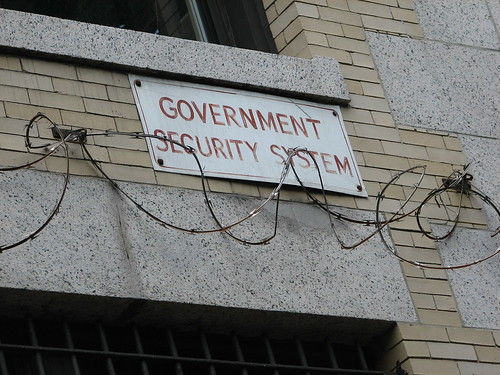In building slides for our ongoing NIST Framework for FISMA class, I put together a deck of the ongoing Government security initiatives. It’s plenty of stuff to keep you busy.

“Government Security System” Photo by Kahala
These are some of the more interesting initiatives and a brief description of them:
President’s Management Agenda Scorecard: This is a quarterly red-yellow-green (hmm, wonder why nobody but the military uses black-red-yellow-green) scorecard on the various aspects of the agenda. Security is represented as some of the values behind the E-Government score. More specifically, OMB calls out the following in their FISMA report to congress:
To “get to green” under the E-Government scorecard, agencies must meet the following 3 security criteria:
- IG or Agency Head verifies effectiveness of the Department-wide IT security remediation process. (rybolov: Plans of Actions and Milestones)
- IG or Agency Head rates the agency C&A process as “Satisfactory” or better.
- The agency has 90 percent of all IT systems properly secured (certified and accredited). (rybolov: C&A does not always equate to “secured”, but is an indicator)
In order to “maintain green,” by July 1, 2008, agencies must meet the following security and privacy criteria:
- All systems certified and accredited. (rybolov: same C&A caveat as before)
- Systems installed and maintained in accordance with security configurations. (rybolov: lots of wiggle room here since it’s the agency’s standard except for the Federal Desktop Core Configuration)
- Has demonstrated for 90 Percent of applicable systems a PIA has been conducted and is publicly posted. (rybolov: PIA is a Privacy Impact Assessment. It gets posted in the Federal Register as a public notification of what the Government is collecting and what the use is)
- Has demonstrated for 90 percent of systems with PII contained in a system of records covered by the Privacy Act to have developed, published, and maintained a current SORN. (rybolov: System of Record Notice, this is what is filed with the Federal Register)
- Has an agreed-upon plan to meet communication requirements for COOP and COG. (rybolov: Continuity of Government)
You can view the current scorecard and learn more about it at results.gov.
OMB Management Watch List: This is a list of “at-risk” projects. Security is one part of the list of risks, but for the most part this is a list of high-risk projects within the context of a program/project manager. The security criteria for being on the Watch List are based on on IG assessments of:
- Certification and Accreditation
- Plan of Actions and Milestones
- Privacy Impact Assessment
You can check out the most recent Watch List at OMB’s website.
Combined Catalog of Controls: Superseding DoDI 8500.2 (DoD catalog of controls) and DCID 6/3 (intelligence community catalog of controls) with a reinforced SP 800-53. Process flow would be along SP 800-37. I’ve talked about this before.
Security Line of Business: Agencies become subject-matter experts in an area and become a contractor to the other agencies. Not a new concept, we’ve seen it elsewhere.
Privacy Management: OMB Memo 07-16 lays out a privacy plan containing the following tenets:
- Breach Notification: Requires each agency to have a breach notification policy
- SSN Reduction: Each agency reduces the use of Social Security Numbers where not needed
- PII Reduction: Restrict the collection of PII where not needed
- Rules of Behavior: Rules for employees to follow when they deal with PII
SCAP and FDCC: I’ve covered these in much detail.
Trusted Internet Connections: This is a plan to reduce the number of Government internet connections to 50. Even the most ardent OMB supporters have to agree that this is both a fairly arbitrary number, not achiveable in the next several years, and not even really a good idea. You heard it here first, folks, but conventional wisdom says that 500 is a better, more realistic number for the time being, and that is the “real” number that OMB is considering. The start of this is OMB Memo 08-05.
Einstein: Basically a Government-wide IDS and SIEM run by US-CERT. It’s offered under the Security Line of Business. The good thing about Einstein is that it allows DHS to correllate events government-wide.
Air Force Cyber Command: It’s provisional now, doesn’t have a permanent headquarters, and is trying to figure out what its mission is, but it’s here. Gossip around town is that it’s focused on both defensive and offensive missions, although they pictures are all defensive-based. There’s some information on their website, but be sure to read between the lines. =)
Cyber Corps: Scholarship program for college students (both post-grad and undergrad) with a public service obligation following graduation. You can find out more here.
SmartBuy: A GSA-run program to bulk-purchase commercial off-the-shelf software at a high-volume discount. Think of it as a buyer’s club for software. SmartBuy has disk-encryption software. You can get more information on the GSA website.
Similar Posts:

 1 Comment »
1 Comment » Posts RSS
Posts RSS

